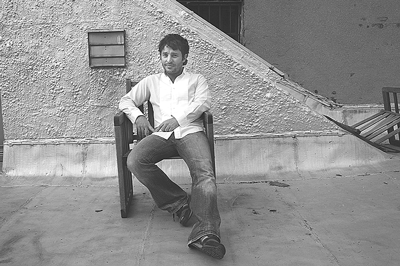By Rachel Fershleiser
If you’re the sort of person who pays attention to theatre directors, here’s a name you must know: Trip Cullman. Only a few years out of Yale’s directing program, the 31-year- old has assisted Mike Nichols and Joe Mantello, worked with top New York theatre companies, and directed five shows this season alone.
His latest production, “Arabian Night,” is an experimental German play by Roland Schimmelpfennig that’s billed as an “erotic urban fantasy.” Now in previews, the Play Company production runs through July 2nd at the East 13th Street Theatre.
Cullman couldn’t be happier to be living and working downtown.
“Downtown is more my energy,” he says, over something pink and iced at Tea Spot on MacDougal. “All the restaurants and arts that I love are down here. I couldn’t possibly imagine living on the Upper East or Upper West Side” — even though the Upper East Side is where Edgar Cullman III was born. He’s been called Trip his whole life, and lived in the Village “ever since I’ve been an adult.” A self-proclaimed “king of high school musical theatre,” he studied acting as an undergraduate at Yale and began to direct at Off Off-Broadway houses like Nada and The Piano Store soon after.
“They were both on Ludlow,” Cullman says, “and unfortunately now they’re both fancy bars.”
Cullman is friendly but intense, with dark eyes that are difficult to look away from when he’s speaking. Dressed in a tuxedo shirt, jeans, and trendy blue sneakers, his style is as quirky as his choice of words to describe the current state of theater. Rinne Groff’s play “The Ruby Sunrise,” he says, was “an amazing, amazing, amazing, amazing experience.” American playwrights are “the ur-artist, the big kahuna.” And some good ones? “Elizabeth Meriwether, Adam Bock – just gobs and gobs of great young writers.”
In short, he says, “I don’t buy that whole ‘theatre is dying’ thing.”
He’s especially optimistic about opportunities for theatre artists in present-day New York — Pianos and Nada be damned. “Places I’ve worked this year, like Playwright’s Horizons, Second Stage, and MCC are really amazing institutions that nurture artists and aren’t as dependent on great reviews or getting a big TV star in the cast. They just want to support work.”
He also applauds corporate sponsorship of nonprofit theatre, citing Signature Theatre’s partnership with Time Warner, which makes all shows this season $15. “Price can be a huge stumbling block, and now it’s affordable for young people to go.”
Though Cullman is well-respected and well on his way to becoming well-known, it’s only fair to say that his recent productions — like the Peanuts satire “Dog Sees God,” the fantastical folktale “The Wooden Breeks”, and the culturally charged mother-daughter drama “Manic Flight Reaction”— received mixed reviews from critics. Cullman, though, was hardly mentioned in those reviews.
He’s trying to learn not to read them, but he also thinks that “99.9% of reviewers have no idea how to asses the director’s contribution to a production.”
“I always find they just say ‘well-paced’ or ‘crisply directed by,’ ” he says. “These adjectives that are sort of meaningless and have nothing really to do with what I’m actually contributing to the work.”
So what is he contributing? “If a playwright is the author of the text, the director is the author of the production — anything you perceive on stage is part of a long and arduous decision-making process,” he explains. “I’d venture to say that the more problematic texts directors are given, when they then make [them] into viable productions, that’s the incredible amount of work on the director’s part.”
Cullman certainly doesn’t shy away from material that is strange or difficult. (This is the same director, after all, who’s taken on a Peanuts satire and an “erotic urban fantasy” in the same season.) He also collaborates with actors in a way that leaves them wanting more. A few months ago Keith Nobbs, a frequent Off-Broadway actor and “Dog Sees God” star told me “Trip is unbelievable in how he creates an environment, how he lets us create our own characters and then guides us. I definitely think he’s on the brink of becoming the next important theatre director.”
Logan Marshall-Green of “OC” fame, and also a “Dog” cast member, added, “He’s one of the best directors I’ve ever worked with. He’s got his own style, and it works for actors of any ability, experience, or type. He’s really an actor’s director.”
Working almost exclusively on new plays, Cullman prides himself on being something of a playwright’s director as well. “I’d like to think I’m someone a playwright would like to go to,” he says, “because I’m not going to impose my own directorial vision at the expense of the play itself. I try to find a marriage.”
In order to take on a new play, Cullman needs to fall in love with something about it. Often it’s the playwright. In the case of “Arabian Night,” it was what the playwright left out. “Part of the way Roland has written the play is to give a blank canvas to a director. It’s quite open for directorial interpretation,” he says. “I’m staging something that’s abstract, almost like a dance piece, and pushing some boundaries and envelopes that I haven’t been able to before, so it’s really exciting for me.”
This summer, he’ll be directing a new Keith Huff play at New York Stage and Film; in the fall he’ll helm “Dark Matters” (“such a cool play!”) at the West Village’s Rattlestick Theater. And next year he’ll direct his first musical, a garage rock show he’s currently developing.
“I’m definitely interested in moving on to Broadway at some point in my career.” Cullman says. “And I want to pursue film and television, but only with the right project. I’m hanging out ‘til then.”
Arabian Night is at the East 13th Street Theatre through July 2nd. For tickets, visit www.ticketcentral.com or call 212-279-4200.





































